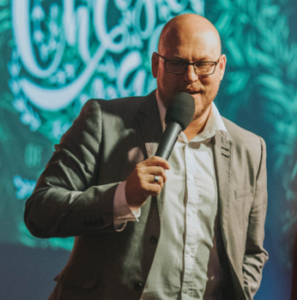In our innovation section we present an Israeli startup company that developed a unique apple-picking robot. Tevel Aerobotics Technologies is located in Gadera and sees in the fruit industry the most suitable market for its advanced developments.
At the start of our conversation, CEO Yaniv Maor, states that Israel is an intersection of knowledge center and AI. “a knowledge center for advanced agriculture. The most diverse and concentrated fruit market in the world”. Maor adds that “in a two-hour distance from our headquarters, you can find all kinds of fruits and species: apple, nectarines, peaches, avocado, mango and citrus. It is a small yet interesting and attractive market. Israel is our first market.”
Can you tell us more about your advanced development, which is mainly used for apple picking by drones? When did you start developing it, where did you test it and what kind of abilities were tested on the field
I would like to set the record straight – we do not call it a drone, but a flying robot, and we pick more than just apples, we pick fruits. The flying robots are attached to the ground by a cable, and through this cable they receive energy and transfer data from the sensors to a computer on the ground.
We are currently fixing the last issues of the technology – we have a high picking rate, there is hardly any harm to the fruits, we pick a high percentage of fruits in the orchards we are working in, and the issues are under control.
We started the product building stage – a robust, effective, reliable and suitable solution for our clients’ orchards. Our plan is to become tradable in the apple picking market by the end of 2021, and maybe beforehand in the plum market.
We choose to start in easier places for us – fruit walls and organized orchards, we will gradually start working in other kinds of orchards.
How effective does the drone make the farmer’s job
Today’s farmers are facing a problem – they don’t have enough fruit-picking employees. Over the past 20 years, fruit orchard production was doubled and even tripled, however, the employment rate in the agriculture field has dropped by 50%. This manpower shortage is a global phenomenon – and this is the problem we need to solve. We conducted large-scaled research which included data analysis of ministries of agriculture in a couple of states and with farmers from all around the world and we were shocked to discover that fruit picking costs are between 20%-35% of growth costs! The main cost nowadays is not water and material but manpower costs, decreasing manpower.
In the future, one flying robot will averagely work at the speed of one harvester, but from the farmer’s perspective it will be invisible. We will provide the harvesting services – our team will arrive our team will arrive with the robots, will operate them on the field and would pick the fruits for thefarmers. The farmers do not need to invest in equipment and take risks, we are charging by the ton, similarly to what farmers pay today
Drone-based sensors are an advanced generation in recent years. How big is this market globally
The drone market is indeed growing, but it is not the right market for comparison. As stated, this is not a drone that flies high and takes pictures. This is a local flown robot, that can reach a maximum height of 5 meters.
The more relevant market is the market of agriculture robots, an exponentially growing market in modern countries. Today the market stands at $5 billion a year, and by 2025 it will get to $20 billion a year. The most important task in the market is fruit harvesting.
The global agriculture market is huge and at its inception as well. 25 million tons of apples and oranges are being picked in the US and Europe every year alone, an amount worth about $2.5 billion a year. It is important to understand that there is still a long way to go, and it is going to take about 10 years to reach a volume of 10% of the global market. I believe that in advanced countries such as Israel, the US, Europe and China the invasion would happen earlier.
How did you come up with the idea of designing and developing a drone used for agriculture, How much have you invested in development and where did you get your funding from, What kind of financial aid have you gotten from Israel Innovation Authority
the idea came from a need for a solution. I discovered the need 10 years ago, watching a television show. The host brought dozens of employees to work at harvesting, but the next day they all left. All workers left! He tried to encourage the government to inspire veterans to work in harvesting and agriculture. I saw it in a different light, the solution must be a technological one. Things will only get worse so there is no other choice. I felt like I must do it – I must find a solution. The next morning I went to an orange orchard and realized that the necessary algorithmics and computer systems are non-existent, and that we have to wait for technology to continue to develop. Now I know that this technology is called artificial intelligence.
4 years ago, when I saw that the technology is in late development, I decided to start working on a solution. At first, I took the conventional route and thought about a robot that will operate on the ground, but I quickly came to realize that the costs will be high and that it will have limited movement. There is a need for something “small and cheap that can be maneuvered.” And then, in my kitchen, I had an idea – why not fly the arm?! At first it seemed a bit crazy, but after some calculations I figured it was the cheapest and most optimal way to maneuver. I quickly patented it and founded a company with a few amazing people that some of them are leading the company to this day.
The funding resources are diverse, this is an elaborate and big project, and it takes capital to operate it. There are some private investors that were with us from the very beginning, some of them are well-known names in the industry, such as Ziv Aviram – Co-Founder of Mobileye, Amichai Steimberg – former CEO of Orbotech and Eyal Desheh – my partner and chairman of the board.
Some venture capital funds such as Maverick Ventures Israel, AgFunder and OurCrowd, have invested and are still investing in the company, joined by strategic investors in the present round.
I have to give credit to Israel Innovation Authority, which supported our company substantially along the way. It understands the technological challenges, the business potential and the added value we bring to the agriculture industry. The authority’s support was, and is, critical in every step of the way and we are grateful for it.
Tell us about the company. How many employees work at the company, who are the key figures and shareholders
The company consists of 35 employees. About 20 amazing software and algorithmics people, a small and stellar engineering team, a QA department and an operation department that runs the experiments on the field.
Dr. Adi Taflia is our Algorithm Team Leader, Moshe Eli is our VP of Engineering, Or Shefi is Head of Software, Andrea Sabty, Head of QA, Ittai Marom is our COO, Freddy Raitan our CCO, Gregory Khodos, Aeronautical Engineer, Ori Aloni, Field Operations Manager and many more employees – there are no small cogs in our machine, every single employee is essential!
Eyal Desheh, our Chairman of the Board, is involved in the strategic planning and thinking, and then there’s me, the founder, CEO and R&D Manager.
We all share one thing in common – our sense of mission. We are creating a solution that will maintain the chain supply of fruits around the world. Can you imagine a world without Combine? At the end of the decade, we will say the same thing about robots.
Are there any more plans for aiding global agriculture in your pipeline
Most definitely, more kinds of fruit harvesting and more agricultural tasks – an apple-picking robot, thinning out ripe fruits, selective pruning and more.
Not Just an Apple Picking Robot
Yaniv Maor is married to Shirly and is the father of Tslil, Adva and Inbal. The company’s name is an acronym for his daughters’ names. He lives in Modi’in.
He has 20 years of experience in product development and technological systems under his belt. He led several products from ideas to developments in the consumer goods, security and industrial fields. “proud to be doing the same thing in the agriculture field today,” as he said
Yaniv Maor has a BSc in Computer Engineering and a M.E. in Systems Engineering from the Technion. He developed 28 patents over the years and has won numerous awards for products he developed.






